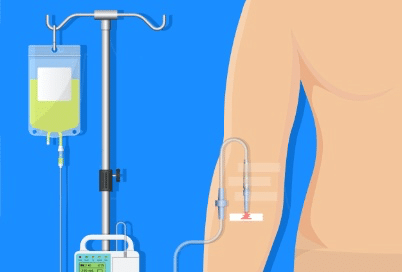There are now many infusion-based medications approved for patients with Crohn’s Disease and Ulcerative Colitis. These medications are administered through an IV over a period of about 2 hours. Your physician will discuss risks with this type of therapy as it can lower your ability to fight infections.

An intravenous (IV) infusion is a medication that enters your blood stream from a needle placed in a vein (IV in your arm, rather than a medication that is swallowed). A healthcare professional will always be close by while you receive treatment and for a period of time afterward to monitor for any side effects.
You will be seated in a comfortable recliner for 2-3 hours. Many patients read or nap during this time. We have cable television and Wi-Fi at our office. You are welcome to bring a laptop or iPad and connect to our Wi-FI during this visit. Since you will have an IV placed in your arm, knitting or other hobbies that require arm movement or full range of motion are discouraged.
We suggest that you wear loose, comfortable clothing that does not restrict access to your arms/elbows. If you are often chilled, you may want to bring a blanket or a sweater as the infusion room can be a little cool and you will be sitting still for several hours.
No, the infusion will not hurt or burn.
You should notify the office if it is time for an infusion and you have symptoms of an active infection so that you can be evaluated and treated by your primary care physician before the infusion can be administered. We’ll work with you to reschedule the treatment after your infection is over.
Your physician will discuss the risks and possible side effects with you before the treatment is ordered. You should tell your doctor right away if you have any of the signs listed below:
- Infections (like TB, blood infections, pneumonia)- fever, tiredness, cough, flu, or warm, red or painful skin or any open sores. REMICADE can make you more likely to get an infection or make any infection that you have worse.
- Lymphoma, or any other cancers in adults and children.
- Skin cancer – any changes in or growths on your skin.
- Heart failure – new or worsening symptoms, such as shortness of breath, swelling of your ankles or feet, or sudden weight gain.
- Hepatitis B -feeling unwell, poor appetite, tiredness, fever, skin rash and/or joint pain.
- Liver injury – jaundice (yellow skin and eyes), dark brown urine, right-sided abdominal pain, fever, or severe tiredness.
- Blood disorders – fever that doesn’t go away, bruising, bleeding or severe paleness.
- Nervous system disorders – numbness, weakness, tingling, changes in your vision or seizures.
- Allergic reactions during or after the infusion – hives, difficulty breathing, chest pain, high or low blood pressure, swelling of face and hands, and fever or chills.
- Lupus-like syndrome – chest discomfort or pain that does not go away, shortness of breath, joint pain, rash on the cheeks or arms that gets worse in the sun. The more common side effects with infusion medications are respiratory infections (that may include sinus infections and sore throat), headache, rash, coughing and stomach pain.
- Psoriasis – new or worsening psoriasis such as red scaly patches or raised bumps on the skin that are filled with pus.
Of course, you’ll be with us for several hours so feel free to bring a snack or meal to enjoy.
Side effects do occasionally happen; we make every effort to carefully review your medical history before prescribing this course of treatment. In addition, you will be monitored closely during the infusion. Depending on your reaction, the therapy may be adjusted or stopped, other medications may be prescribed to counter act side effect symptoms. Additional tests may be performed to see how well you respond to the treatment.
Your doctor will require an annual TB test and evaluate you at every visit.
No, you can continue your normal schedule as advised by your physicians.

